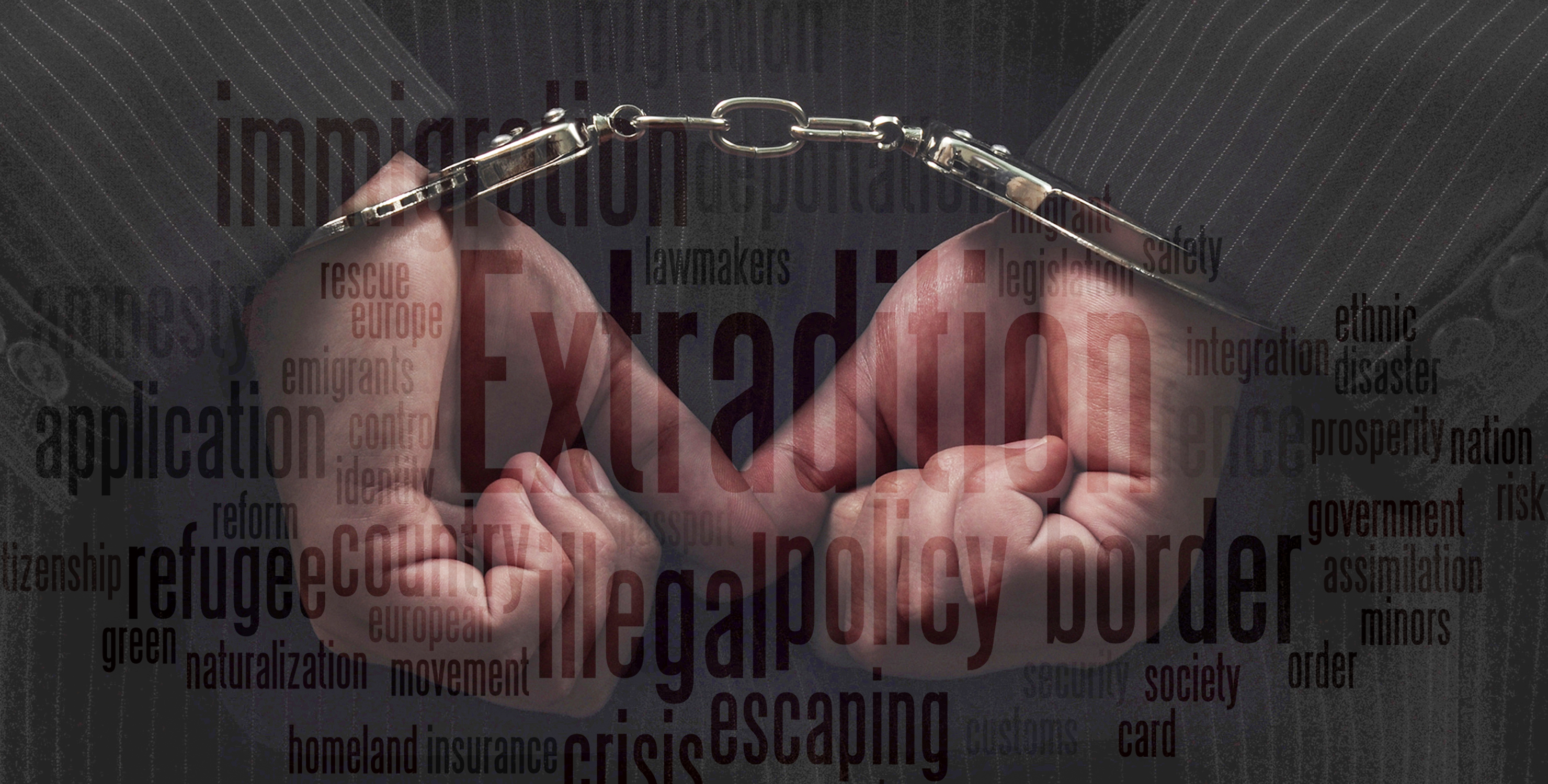On Tuesday, 4 November, the Constitutional Court will hear a challenge on how South Africa handles extradition requests, a case that could see some of the country’s most notorious fugitives go free.
At least three high-profile people have already used the loophole to escape extradition, with more expected to follow suit. One, Richard Payne, who is in the United Kingdom, is accused of defrauding the Gauteng Department of Health of R700-million. Despite a decade of investigation, Payne remains out of reach.
/file/dailymaverick/wp-content/uploads/2024/08/ED_516536.jpg)
Another person who has benefited from the loophole is former ANC secretary-general Ace Magashule’s former personal assistant, Moroadi Cholota, who was extradited to South Africa in August 2024 in connection with the R255-million asbestos scandal, which included charges of fraud, corruption, theft and racketeering.
And most importantly, Johnathan Richard Schultz, a South African resident who was among those arrested in 2019 in connection with the alleged theft and sale of unwrought precious metals. Schultz, who now resides in the US, initially brought the case challenging his extradition, which raised the loophole.
Read more: Moroadi Cholota asks court to declare Free State asbestos charges unconstitutional and invalid
The loophole
When his co-accused appeared in court, the National Prosecuting Authority (NPA) sought a postponement to allow time for the prosecution team to request Schultz’s extradition from the US, which has not happened to date.
Schultz’s case is challenging the long-standing practice in South African law: who has the power to ask another country to extradite someone to South Africa to face trial, something which the NPA has done for more than 60 years.
Schultz believes that only the Minister of Justice, and not the NPA, can legally make such a request under South African law. In 2022, the Gauteng Division of the High Court in Pretoria disagreed and found in favour of the NPA, which argued it had the power to initiate the requests, as it had done so in good faith for decades.
Both the National Director of Public Prosecutions (NDPP) and provincial Directors of Public Prosecutions (DPP) have argued that extradition has two parts: domestic and international.
Domestically, the NPA has the power to decide whether someone should be extradited to face criminal charges, using its powers under section 179(2) of the Constitution. Internationally, the Department of International Relations and Cooperation (Dirco) represents South Africa and sends the request to the foreign country. This applies whether the request was initiated by the NPA or the Justice Minister.
In December 2024, however, the Supreme Court of Appeal (SCA) overturned the Pretoria high court decision and agreed with Schultz when it ruled that the NPA had, in fact, overstepped because the Extradition Act of 1962 never explicitly gives the NPA the authority to make outgoing requests.
That decision, known as the Schultz judgment, effectively meant that every extradition request the NPA had ever made could now be challenged as invalid, because they had been made by the wrong authority.
Extradition work wasted
The SCA ruling is now before the Constitutional Court, which must decide whether it should stand and, if it does, whether it applies retrospectively to all past extradition requests made by the NPA.
If the highest court in the land rules against the NPA, it means every extradition request made by the NPA could be challenged, allowing many alleged criminals beyond the borders of South Africa to escape justice.
The now-suspended Gauteng DPP, Andrew Chauke, and the NDPP, Shamila Batohi, in their written submissions before the Constitutional Court, say this will have devastating consequences for the NPA, the criminal justice system and South Africa as a whole.
Read more: Old ghosts of Zuma State Capture era come to haunt suspended Gauteng DPP Andrew Chauke
They have warned that if all extradition requests made by the NPA are suddenly open to review because they should have been made by the Minister of Justice, “then the NPA, South Africa’s criminal justice system, and South Africa itself will be deeply and irreparably prejudiced”.
The NPA says that each outgoing extradition request takes months, sometimes years, of careful preparation.
“Quite literally, thousands upon thousands of hours of work goes into the preparation of each of them, sometimes more.”
“The massive effort that goes into preparing each outgoing extradition request will be wasted (or, at a minimum, will have to be repeated) if the extradition requests are held to be formally defective in light of Schultz and are set aside.”
The consequences, it said, would reach far beyond the courtroom, “damaging public confidence, weakening the rule of law, and undermining the trust of foreign partners in South Africa’s justice system”.
Alleged criminals walk free
The potential fallout is already visible in several high-profile cases. One of the most striking and recent examples is when Cholota, whose extradition had already been finalised – and she had appeared in a local court – walked free after relying on the Schultz ruling, raising a special plea to challenge her extradition.
Her highly publicised case, which was once seen as a crucial step in holding corrupt officials accountable, fell apart before it even began.
In the case of Payne, which dates back more than a decade, the DPP submitted a request for his extradition from the UK in 2022 to face charges of racketeering, fraud, corruption and money laundering in South Africa.
In that request, the DPP said he was responsible for matters related to instituting and conducting prosecutions under section 179(2) of the Constitution.
However, court papers show that the Justice Minister did not consider the request, and his consent was not obtained before it was sent.
Payne objected to the extradition in the UK, arguing that the DPP lacked the legal authority to make the request. The DPP responded with a memorandum claiming that the Justice Minister “plays no part in outgoing extradition requests”.
Payne countered that these were the same arguments rejected by the Supreme Court of Appeal (SCA) in the Schultz case.
Two months after Payne’s extradition hearing, the UK Secretary of State ordered that he be extradited, a decision against which Payne has since appealed.
Both the District Judge’s ruling and the Secretary of State’s order were made before the Schultz judgment was delivered, meaning the Constitutional Court’s upcoming decision could determine whether South Africa still has a valid case to bring him home.
In late 2024, the NPA suffered another blow in this extradition matter when it sought to have the appeal heard urgently. Two months ago, Judge LG Kilmartin found the matter was not urgent despite the prosecution's plan to bring about new evidence.
The NPA had argued that its appeal should be heard urgently because “the public’s confidence in it is undermined by further challenges to extradition requests that were unlawfully made”.
But the court found the blame lay squarely with the prosecuting authority itself.
Meanwhile, Schultz’s legal team, Ian Levitt Attorneys, had argued that the NPA had been aware that “other Schultz-like challenges could be brought” but still “did nothing for more than four months”.
‘Hugely significant’
For as long as the SCA decision stands, the public’s trust in the criminal justice system and South Africa’s reputation as a country that takes crime seriously are hanging by a thread, according to the NPA.
With the SCA having collapsed the distinction between domestic and international roles, the NDPP believes this move has effectively “deprived the NPA of its prosecutorial independence and opened the door to political interference in the criminal justice system”.
In its application for leave to appeal, the NPA believes it is necessary for the highest court in the land to “remedy the errors made by the SCA”.
NPA spokesperson Bulelwa Makeke told Daily Maverick the Constitutional Court hearing “is hugely significant, with far-reaching implications for extradition applications. We will not comment further as the matter is being heard on Tuesday.”
The Constitutional Court will hear the matter on Tuesday, 4 November. DM





 Illustrative image: In December 2024, the Supreme Court of Appeal found that the Extradition Act of 1962 never explicitly gives the NPA the authority to make requests to another country. (Photos: iStock / Adobe Stock)
Illustrative image: In December 2024, the Supreme Court of Appeal found that the Extradition Act of 1962 never explicitly gives the NPA the authority to make requests to another country. (Photos: iStock / Adobe Stock)